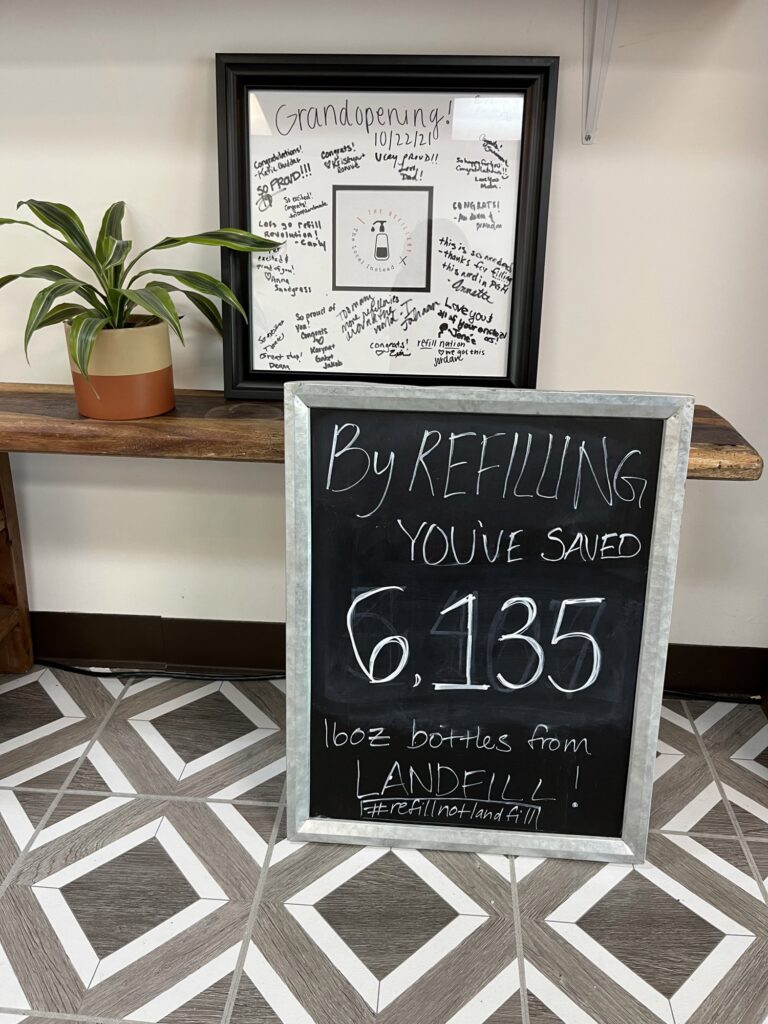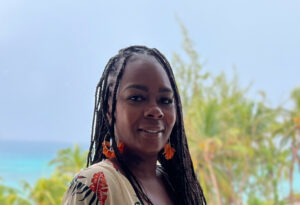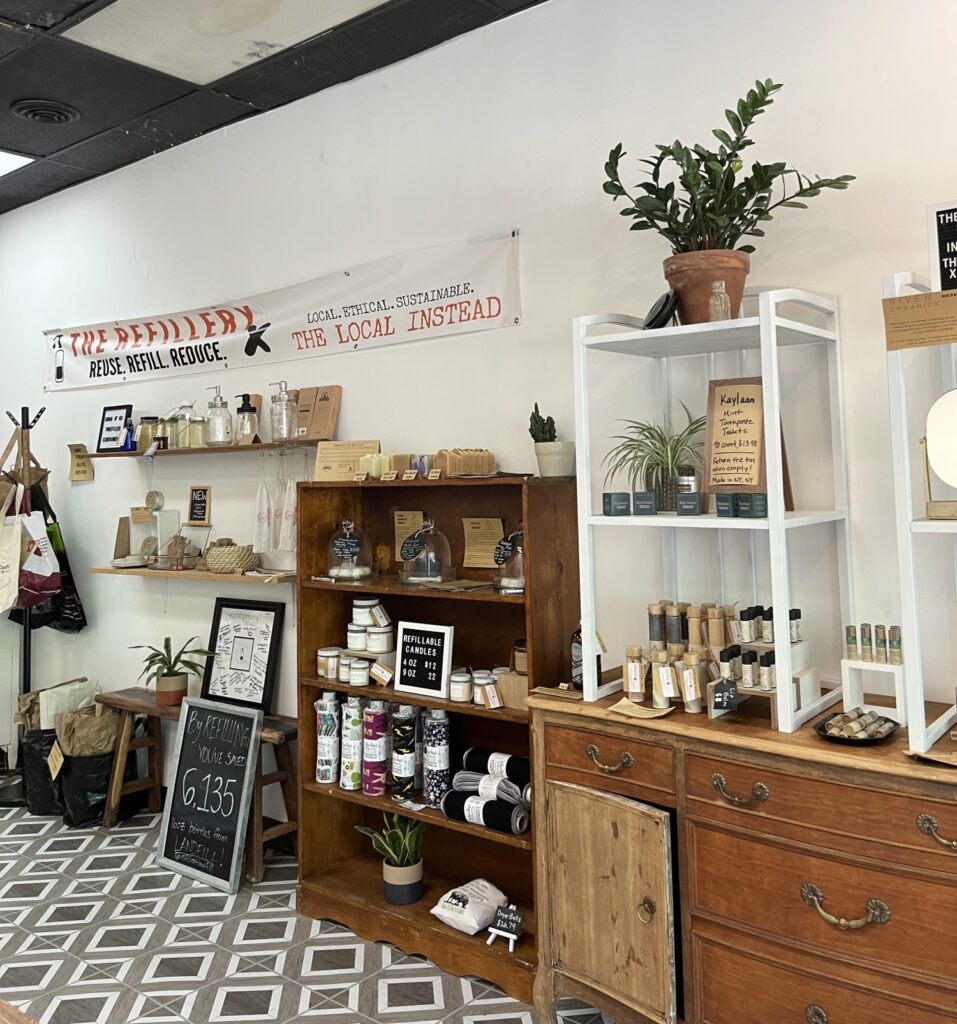
The COVID-19 pandemic, due to concerns about cleanliness, has signaled a dramatic increase in the use of single use plastic – with more than eight million tons of plastic generated globally and 25,000 tons of that going directly into our global ocean. Why is this a problem? Plastic waste not only harms global ecosystems, wildlife, and causes unsightly litter, but it poses a significant harm to human health – whether that be in the way it acts as an endocrine disruptor in the body, or how its microplastic byproducts release chemicals that seep into soil and contaminate water and agricultural systems.
This month, in the wake of plastic free July, WHE sought to highlight the work being done by Squirrel Hill’s The Refillery: a zero-waste store with the mission of providing local, ethical, and sustainable goods to our communities in western Pennsylvania. The Refillery sells personal care, cleaning, beauty, and facial care items, and more, with a sustainable twist – customers can bring their own or borrow containers. Rather than providing containers for things like shampoo, conditioner, dish cleaner, and soap, among other things, the shop prioritizes only selling items that require no container, whose containers can be easily reused in house or through local vendors or can be taken away in containers that customers bring with them to shop.
“I was an engineer at a big corporation for six years before we opened – but I realized it was completely unfulfilling for me, and I wanted to make a difference based on my values,” says Larissa Russo, the owner of The Refillery, on what motivated to start her business. “After quitting in April, applying to the Neighborhood Flea Market and not thinking I would get in, I was invited to join, and had six weeks to bring this entire shop together.”
In this way, the Refillery became a way for Larissa to stay true to her values and aim to share more ethical, safer, and more environmentally friendly products with the community. “I did not have any vendors or an LLC, but in a way that pushed me to do it. Perfection is the enemy of progress.” She smiled earnestly, laughing, “And we live by that.”
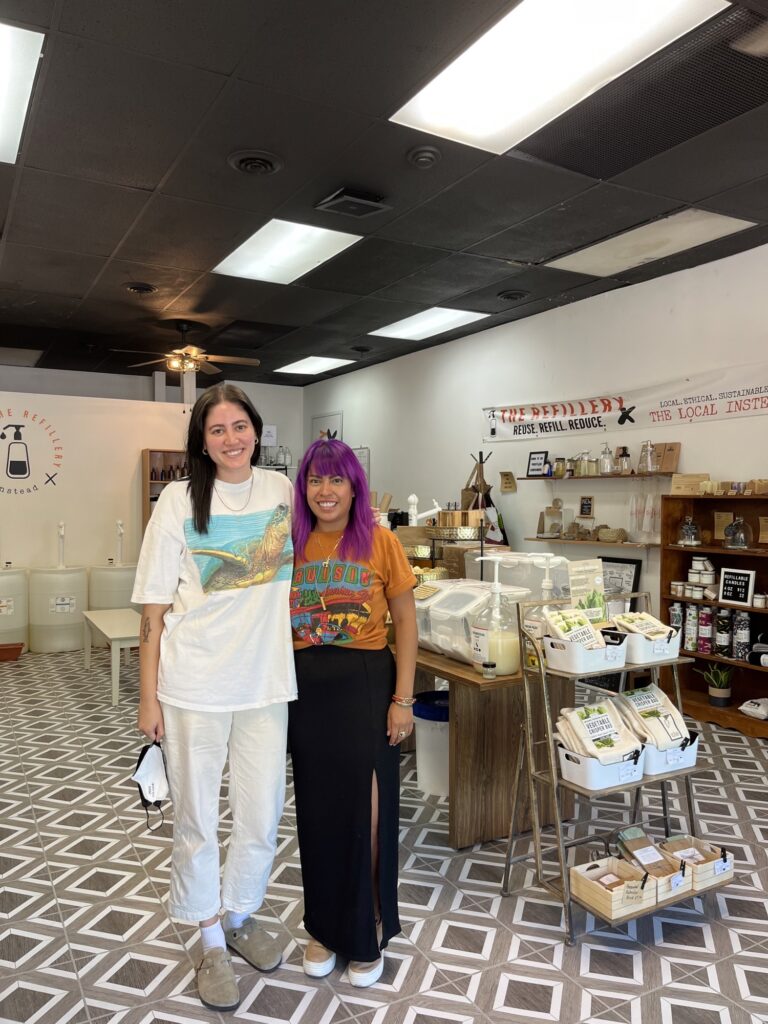
Despite the added barrier to entry of the COVID-19 pandemic, Larissa successfully opened the Refillery in a matter of weeks in spring 2021. When asked about what implications the pandemic had on her business, Larissa says she finds one of the primary complaints she notices among customers is a concern regarding natural products not disinfecting well enough – when often, those qualities are not necessary for every day cleaning needs; “so, we are [fortunately] able to break their habits and help them divorce from brands, and help them learn to clean the right way. It is hard to communicate to people that super cleaning with chemicals is not always better, and that no harmful impacts right now does not necessarily equal none in the long-term.”
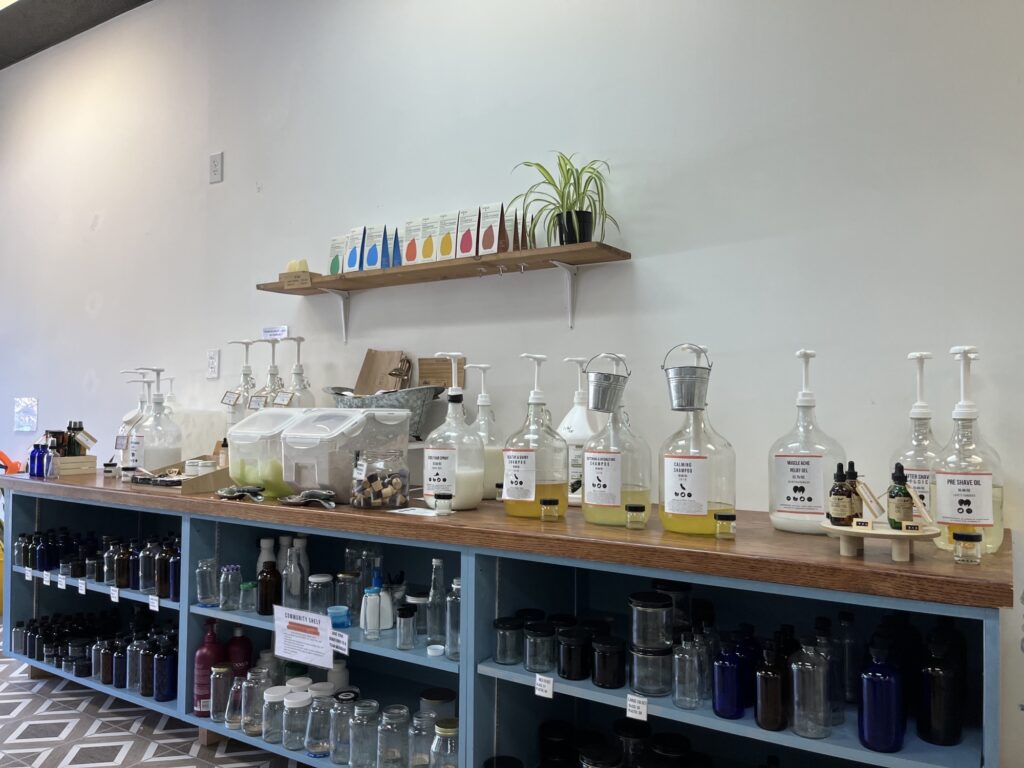
Encouraging consumers to move away from using strong chemicals in homes, schools and other settings is certainly a common goal shared between organizations like WHE and the Refillery; we are aware chemicals like ammonia, chloride, and other acids are commonly found in everyday cleaning products, which risks the health and wellbeing of the user, and the broader environment. However, higher price-points, lower availability, and inconveniences to the consumer in purchasing healthy, and sustainably and ethically sourced products, often drives everyday people to keep purchasing these familiar and reliable – but often, toxic – items. Larissa expanded on this idea of helping people make this mindset shift from short-term to long-term gratification by noting, “This [sustainable] mindset shift must happen over the long-term. [Thinking, for example] “while things sold at shops like ours may cost me more right now, it won’t cost me my health in the future, and will probably last longer.””
When prompted as to how people should reframe thinking about purchasing products, she recommends, “I have recently been trying to get people to identify their top values, and ask themselves, “does this align with the products I am buying?”” Larissa noted that once again, we should not strive for perfection in this practice: “We are not going to be perfect in the way that the system is set up right now. It is extremely hard – greenwashing, where big companies are tricking people into thinking they do things they don’t do, is common, too – but over time, making these minor changes and thinking, “I can get this thing that I need somewhere that aligns with my values” [can really help make this larger shift happen].”
Larissa also noted that like many other businesses throughout the last few years, she has unfortunately suffered from impacts of supply chain issues – but also recognizes that “we know we just must go with it. We love what we do and know if things don’t get to us right away, it will be okay, and we care more about our vendors than the products.”
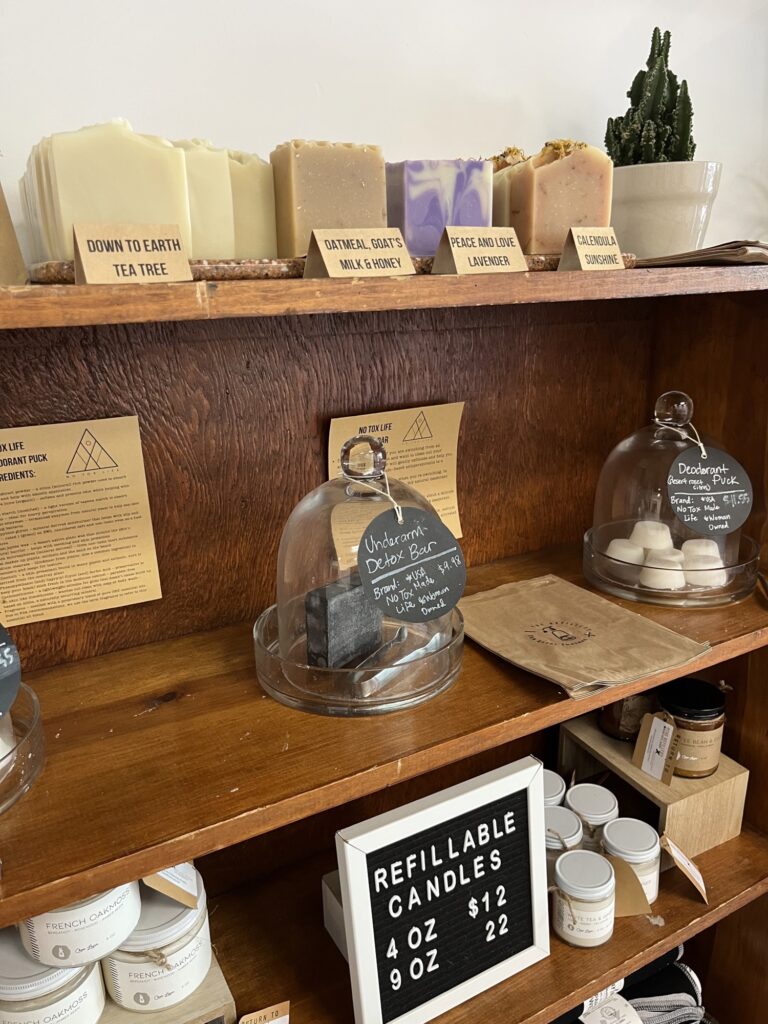
Larissa’s shop emanates care for the work she performs and the vendors that her shop helps support. This attention to holistically supporting local people and communities is one thing that makes her business unique. “We focus on sourcing local as far as sustainability, so we try to look [for products] as locally as possible and when we can’t, we look regionally local, like in Ohio, West Virginia, etc. When we cannot do that, we buy products that are always made in the United States.” Sourcing locally is not the only reason Larissa likes to ensure her businesses are small and typically women-owned – “it is really important [to our business] that we make sure that the companies we source from are paying their workers minimum wage and making sure they are following and integrating our values at every level.”
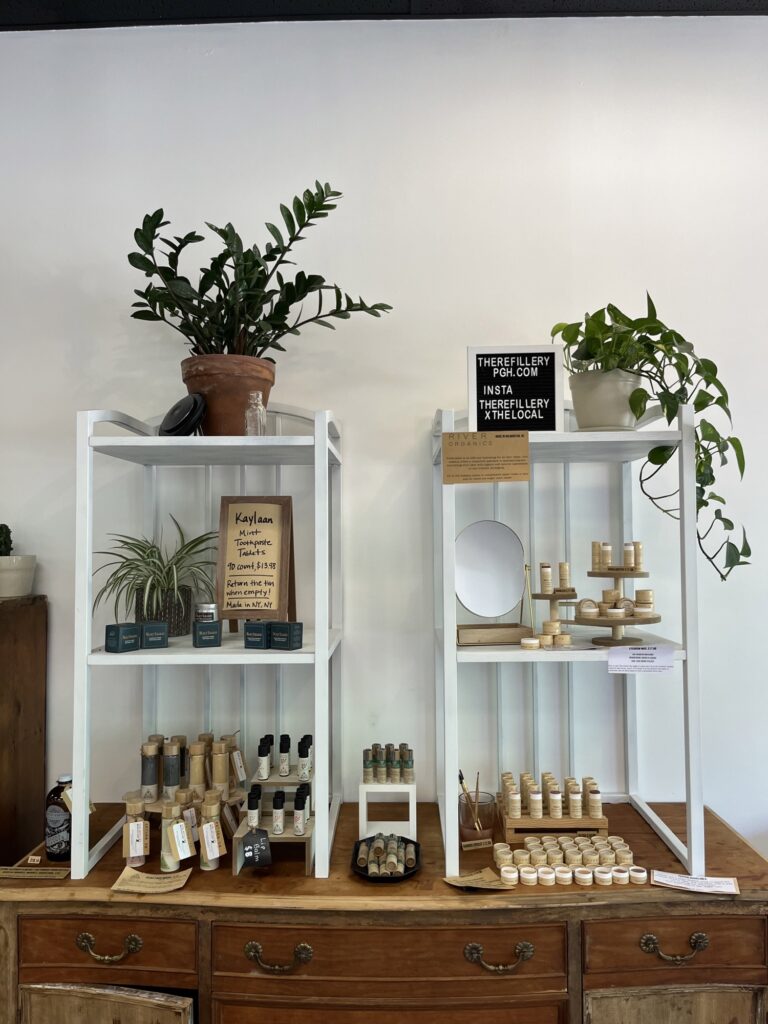
Though this presents some challenges to product availability, “it is fun because we can expand our product line and boost other local suppliers by collaborating on making certain products.”
Despite supply chain issues that have delayed some products from being rolled out, the shop has a wide variety of personal care products, ranging from conditioner bars to bamboo cleaning tools. Larissa and her assistant manager, Jordan, were excited to share some of their favorite products currently and soon to be available at the Refillery.
“The toilet tabs are my current favorite,” Jordan shared, gesturing to a glass container with about 100 small, white granule capsules inside. “If you get one, it may not look like it’s doing anything at first, but trust me, you don’t have to see a fluorescent blue color afterwards to know it works.”
Larissa offered, “The toothpaste tablets – that require no container and fizz and bubble in your mouth – are my current favorite,” and added with excitement, “We’ll also have mouthwash tablets coming in soon, which I also love!” You can begin looking out for those, at their shop or online, any time in the next few weeks.
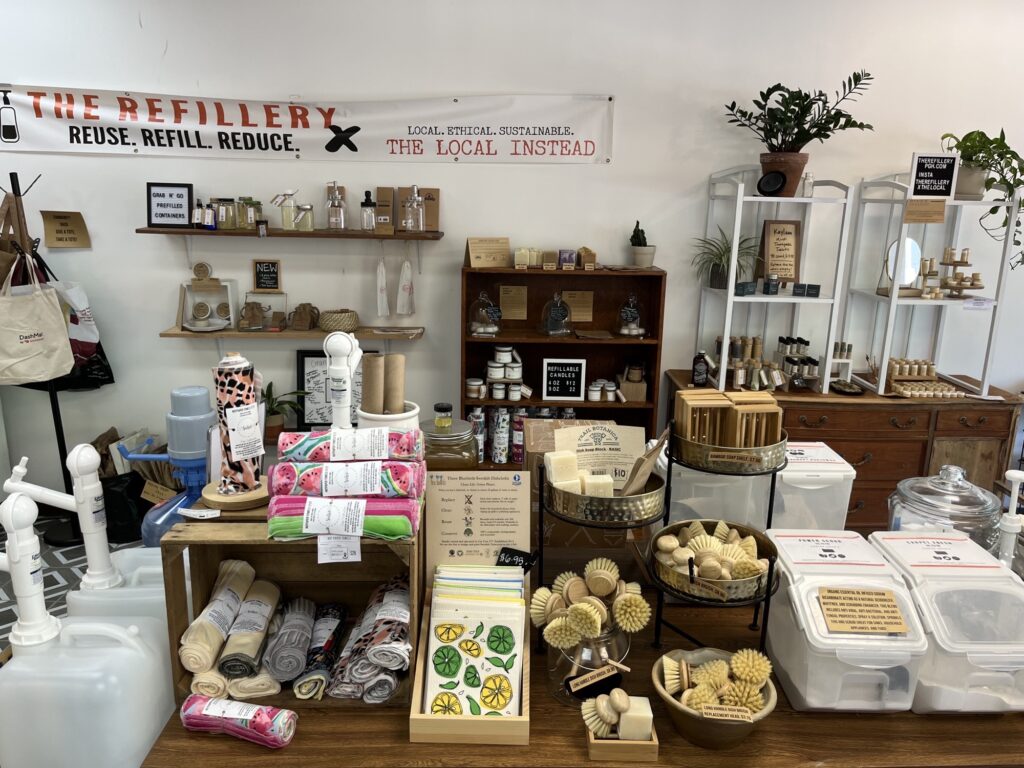
Zero waste practices are not the only way that the Refillery hopes to achieve this widespread shift towards eco-consciousness. Larissa also shared community building is at the heart of everything she does. “We are always thinking about how we can be giving back, and how we can bring our community together. We set aside a specific section in our store for workshops, meetings, and pop-ups to do that. We want to be a place where we can consistently bring people together.”
Further, Larissa and other employees go to great lengths to encourage their vendors and customers to get registered to vote, do research on candidates, and get out to vote, which they view as one of the great ways to make our voices heard. In the future, WHE hopes to collaborate with businesses like the Refillery to encourage and harness this same power of the vote.
“[I]t is [all] about defining your ethos, which drives everything we do.”
As for the future of the Refillery and businesses considering similar sustainable business models, Larissa feels optimistic, but provides pragmatism to those looking to follow a similar path. “I am not really of the mindset that “if I can do it, you can too!” I am lucky that coming into this I was financially set up, and have a great support system, where if I fail, those around me will help me. So, make sure you have that support system set up and have your financials in order. But we need more types of businesses like ours, and I would love to help launch a series to help people change these bigger systems.” But when it comes down to personally prioritizing sustainability and what that can mean for the greater good, Larissa concludes our talk with hope: “[I]t is [all] about defining your ethos, which drives everything we do.”
